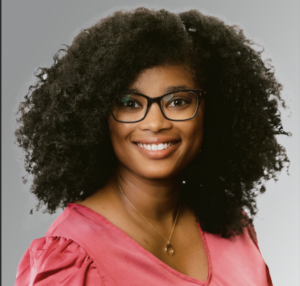Third-year undergraduate Isabelle “Izzy” Connor and two Ph.D. candidates at other universities have recently won awards to further their research in astronomy and astrophysics at UC Santa Cruz.
Connor (Crown ‘26, astrophysics) is a 2025 Barry Goldwater Scholar, an honor awarded by the Barry M. Goldwater Scholarship and Excellence in Education Program to second- and third-year undergraduate students studying mathematics, science, and engineering. Connor’s research interests lie in high-energy astrophysics, particularly the supernova-driven turbulence rippling through the interstellar medium—the expanse of space outside our Sun’s sphere of influence.
Currently a Lamat fellow, she plans to pursue a Ph.D. in astrophysics while making a positive impact on the STEM community. Notably, in 2021, she competed in the Olympics in Tokyo as a rhythmic gymnast, becoming the first UC Santa Cruz student ever to compete in the games.
The two Ph.D. students are Caprice Phillips and Kyle Franson, each awarded a Sagan Fellowship through the NASA Hubble Fellowship Program, which recognizes early-career astrophysicists who demonstrate innovative research. The Sagan Fellowship supports scholars whose research helps answer the cosmic question, “Are We Alone?”

Phillips plans to complete her Ph.D. in astronomy at Ohio State University this summer before joining UC Santa Cruz in the fall. Her research combines observational and computational methods to understand the atmospheric, physical, and chemical processes in brown dwarfs and directly-imaged planets. She also works on the stellar abundance measurements of solar-type hosts of brown dwarf companions to investigate their formation pathways.
As a Sagan Fellow at UC Santa Cruz, Phillips will use data from the James Webb Space Telescope to further our understanding of brown dwarfs and advance the existing methods for observing them. She earned her bachelor’s degree in physics at the University of Arkansas at Little Rock and a master’s in astronomy at Ohio State.

Franson also plans to complete his Ph.D. in astronomy this summer, at the University of Texas at Austin, before coming to UC Santa Cruz in the fall. He studies methods for detecting and measuring exoplanets, which are planets outside our own solar system. Combining direct imaging from telescopes with astrometry—a technique for locating distant planets by detecting a wobble in their host star’s position—Franson hunts for exoplanets and measures their characteristics.
As a Sagan Fellow at UC Santa Cruz, Franson will build on the growing synergy between exoplanet imaging and astrometry to address fundamental questions about the formation, migration, and atmospheres of giant exoplanets.
He earned his bachelor’s degree in physics from the University of Michigan and a master’s in astronomy from the University of Texas at Austin.
